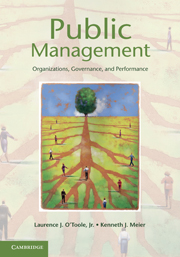Book contents
- Frontmatter
- Contents
- List of figures
- List of tables
- Preface
- 1 Public management and performance: an evidence-based perspective
- 2 A model of public management and a source of evidence
- 3 Public management in interdependent settings: networks, managerial networking, and performance
- 4 Managerial quality and performance
- 5 Internal management and performance: stability, human resources, and decision making
- 6 Nonlinearities in public management: the roles of managerial capacity and organizational buffering
- 7 Public management in intergovernmental networks: matching structural networks and managerial networking
- 8 Public management and performance: what we know, and what we need to know
- Glossary
- References
- Index
6 - Nonlinearities in public management: the roles of managerial capacity and organizational buffering
Published online by Cambridge University Press: 05 June 2012
- Frontmatter
- Contents
- List of figures
- List of tables
- Preface
- 1 Public management and performance: an evidence-based perspective
- 2 A model of public management and a source of evidence
- 3 Public management in interdependent settings: networks, managerial networking, and performance
- 4 Managerial quality and performance
- 5 Internal management and performance: stability, human resources, and decision making
- 6 Nonlinearities in public management: the roles of managerial capacity and organizational buffering
- 7 Public management in intergovernmental networks: matching structural networks and managerial networking
- 8 Public management and performance: what we know, and what we need to know
- Glossary
- References
- Index
Summary
Chapter 5 mentioned that, in the classic Sherlock Holmes tale “Silver Blaze,” Arthur Conan Doyle's famous detective infers an important finding lurking behind an apparent non-event. Similarly, in the last section of the previous chapter we built from something that did not happen – in this case, a very limited negative impact on public program performance even in the face of sizable and negative budget shocks from the environment – to highlight ways that public managers are able to protect their organizational systems from unanticipated and unpleasant disruptions to maintain performance in the face of adversity. Because managers made a series of decisions that reflected key priorities and long-term goals, the “dog that didn't bark” in this latter instance was a set of school systems that did not appreciably suffer – at least in the short run.
This chapter follows the earlier analysis, at the intersection of public management and organization theory, to explore a more general process that bureaucracies use in the face of potentially disruptive circumstances. We first examine the question of whether and how the presence of managerial capacity in public organizations might provide protection or support for public agencies facing environmental battering. Apart from the day-to-day efforts on the part of managers to encourage efficient and effective production, in other words, we ask if reserve capacity has positive impacts on performance. Can capacity be activated in times of crisis to protect the organization? This is the first core research question explored here.
- Type
- Chapter
- Information
- Public ManagementOrganizations, Governance, and Performance, pp. 182 - 239Publisher: Cambridge University PressPrint publication year: 2011

